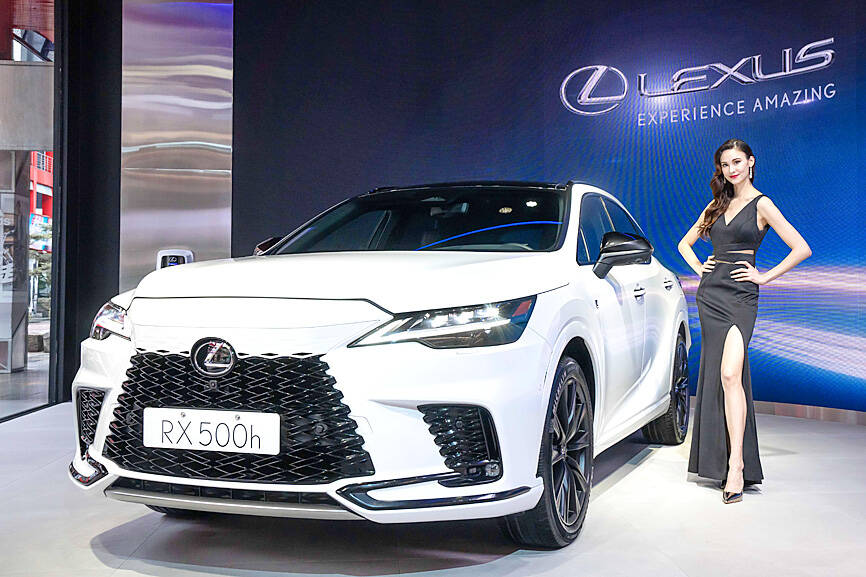Hotai Motor Co (和泰汽車) aims to sell 163,000 vehicles this year, up 8.7 percent from last year, as improving chip supply and recovering consumer sentiment help boost the domestic auto market, the local distributor of Lexus and Toyota vehicles said yesterday.
Last year, Hotai sold 150,000 vehicles under the Toyota, Lexus and Hino brands, down 3.95 percent from a year earlier, as key component shortages and COVID-19 restrictions reduced auto production and supply.
“We expect chip constraints to improve this year, which should help boost vehicle production and supply,” Hotai spokesman Simon Liu (劉松山) told an online investors’ conference. “New vehicle sales expanded 4 percent in the fourth quarter of last year, which showed that market demand remained robust as COVID-19 rules were eased and consumer spending recovered.”

Photo: Amy Yang, Taipei Times
Visitor numbers to its showrooms in Taiwan jumped 20 percent in the first quarter of the year, Liu said.
New vehicle sales in Taiwan this year are forecast to grow 4 percent year-on-year to 450,000 units from 430,000 units last year, he said.
However, as the company has accumulated an order backlog of 15,000 units due to a scarcity of key components, buyers might have to wait for two months for delivery, he said.
The wait for some imported models, such as the Camry and RAV4 series, might be even longer, he added.
“The more electronic components a vehicle is equipped with, the longer the waiting time would be. This also applies to hybrids,” Liu said.
Lead time for locally manufactured vehicles is shorter at two weeks to one month, he said.
Hotai yesterday said that the impact of COVID-19 insurance payout from Hotai Insurance Co (和泰產險) is on the wane as the Centers for Disease Control (CDC) has relaxed pandemic restrictions and from next month, people with mild symptoms would no longer be required to isolate.
“No large sum of COVID-19 insurance policy claims is expected,” Liu told investors.
Given the sizeable payouts from its insurance unit, Hotai Motor posted a net loss of NT$19.33 billion (US$634.7 million) last year, the first loss in 20 years.
Hotai Insurance reported a net loss of NT$36.91 billion last year, after booking massive one-off reserves for potential insurance claims.

To many, Tatu City on the outskirts of Nairobi looks like a success. The first city entirely built by a private company to be operational in east Africa, with about 25,000 people living and working there, it accounts for about two-thirds of all foreign investment in Kenya. Its low-tax status has attracted more than 100 businesses including Heineken, coffee brand Dormans, and the biggest call-center and cold-chain transport firms in the region. However, to some local politicians, Tatu City has looked more like a target for extortion. A parade of governors have demanded land worth millions of dollars in exchange

Hong Kong authorities ramped up sales of the local dollar as the greenback’s slide threatened the foreign-exchange peg. The Hong Kong Monetary Authority (HKMA) sold a record HK$60.5 billion (US$7.8 billion) of the city’s currency, according to an alert sent on its Bloomberg page yesterday in Asia, after it tested the upper end of its trading band. That added to the HK$56.1 billion of sales versus the greenback since Friday. The rapid intervention signals efforts from the city’s authorities to limit the local currency’s moves within its HK$7.75 to HK$7.85 per US dollar trading band. Heavy sales of the local dollar by

Taiwan Semiconductor Manufacturing Co’s (TSMC, 台積電) revenue jumped 48 percent last month, underscoring how electronics firms scrambled to acquire essential components before global tariffs took effect. The main chipmaker for Apple Inc and Nvidia Corp reported monthly sales of NT$349.6 billion (US$11.6 billion). That compares with the average analysts’ estimate for a 38 percent rise in second-quarter revenue. US President Donald Trump’s trade war is prompting economists to retool GDP forecasts worldwide, casting doubt over the outlook for everything from iPhone demand to computing and datacenter construction. However, TSMC — a barometer for global tech spending given its central role in the

An Indonesian animated movie is smashing regional box office records and could be set for wider success as it prepares to open beyond the Southeast Asian archipelago’s silver screens. Jumbo — a film based on the adventures of main character, Don, a large orphaned Indonesian boy facing bullying at school — last month became the highest-grossing Southeast Asian animated film, raking in more than US$8 million. Released at the end of March to coincide with the Eid holidays after the Islamic fasting month of Ramadan, the movie has hit 8 million ticket sales, the third-highest in Indonesian cinema history, Film